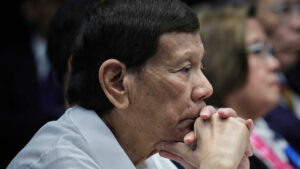By Chloe Mari A. Hufana, John Victor D. Ordoñez and Kenneth Christiane L. Basilio, Reporters
FORMER PRESIDENT Rodrigo R. Duterte’s remarks about his deadly drug war before a Senate probe is likely to give impetus to the International Criminal Court’s (ICC) own investigation of the firebrand leader for alleged crimes against humanity, political analysts said.
“The ICC will now become more motivated in its investigation of the war on drugs,” Josue Raphael J. Cortez, a diplomacy instructor at the School of Diplomacy and Governance of De La Salle-College of St. Benilde, told BusinessWorld in a Facebook Messenger chat on Tuesday.
Mr. Duterte’s testimony at the Senate Blue Ribbon Committee hearing on Oct. 28 “fortified” claims of human rights violations by the international tribunal, he added.
The tough-talking leader said he offers “no apologies, no excuses” for his war on drugs, as he appeared for the first time at a Senate hearing probing the crackdown, where thousands of drug suspects died.
“Do not question my policies, because I offer no apologies, no excuses. I did what I had to do, and whether you believe it or not, I did it for my country,” he told senators.
He also admitted having told cops when he was still Davao City mayor to goad drug suspects to draw their guns and fight back to give cops a reason to retaliate.
“However, one must bear in mind that it is the law of the land that would still dominate, and it is our very own government who will be deciding whether or not they will be permitting the ICC to undertake their investigation regarding the matter,” Mr. Cortez said.
Despite both Houses of Congress having started separate investigations of the drug war, only President Ferdinand R. Marcos, Jr. could decide if the government would cooperate with the ICC probe, he added.
The President has said his government would not cooperate with the ICC investigation because the country has a working justice system.
The states estimates that at least 6,117 people died in Mr. Duterte’s drug war between July 1, 2016 and May 31, 2022, but human rights groups say the death toll could be as high as 30,000.
The Philippines under Mr. Duterte withdrew from the ICC in March 2018 amid criticisms that his government had systemically murdered drug suspects in police raids. It took effect a year later.
Meanwhile, Senate President Francis “Chiz” G. Escudero said the ex-President’s order for cops to goad criminals and suspects to fight back was unbecoming of a civilized government that should ensure due process for all Filipinos.
“We have what we call due process, and we cannot just forget about this and set it aside,” he told a news briefing in English and Filipino on Tuesday. “As a lawyer, he should know that. A civilized government can do nothing less than provide and ensure due process to anyone and everyone.”
During the hearing, Mr. Duterte admitted having used a hit squad that killed criminals in Davao, but denied giving out rewards for these killings.
Mr. Escudero said he would leave it to Senate Minority Floor Leader Aquilino “Koko” L. Pimentel III, who heads a subcommittee of the Blue Ribbon Committee looking into the drug war, to decide on whether to invited ICC representatives to answer questions about Philippine withdrawal from the tribunal.
“I leave it up to the chairman first of the committee and I leave it up to the House [of Representatives] as well,” he said.
The drug war led to more than 12,000 deaths, mostly urban poor, according to Human Rights Watch. It added that at least 2,555 killings have been attributed to the national police.
‘AS POWERFUL AS EVER’
“Presuming the hearings to be conducted would be in aid of legislation or policy to be conducted by the Marcos administration vis-a-vis our relationship with the ICC, it makes perfect sense to have them (representatives) there,” Hansley A. Juliano, who teaches political science at the Ateneo de Manila University, said in a Facebook Messenger chat.
“Based on the rules of procedure for inquiries of both Houses, there’s nothing barring them from inviting international personages,” he added.
“The ICC has to step in because the mastermind of the drug war and perpetrators remain as powerful as ever,” Fides M. Lim, convenor of the human rights and political prisoners support group Kapatid, said in a Facebook Messenger chat.
Arjan P. Aguirre, who also teaches political science at the Ateneo, said only Senator Ana Theresia Hontiveros-Baraquel managed to stand her ground and call out Mr. Duterte for his vulgar statements at the hearing.
He said Mr. Pimentel was not assertive enough as a committee chairman to keep the former President from dominating the discussions.
“Senator Risa was assertive and was able to keep herself calm and objective,” he said. “No one was telling him to stick to the questions. He kept on digressing, which was his strategy to enthrall the crowd.”
Also on Tuesday, Sta. Rosa City Rep. Dan S. Fernandez said the Department of Justice (DoJ) should not mishandle the case against Mr. Duterte once it decides to prosecute him for alleged crimes against humanity under the law.
“If the DoJ fails to do their job on this matter, then the ICC will take more cognizance of it,” he said. “It’s really up to the DoJ to do their work. The international community is really watching,” said Mr. Fernandez, a co-chairman of the House of Representatives quad committee investigating Mr. Duterte’s war on drugs.
Manila Rep. Bienvenido M. Abante in a separate statement noted that by taking full responsibility for the thousands of extrajudicial killings under his watch, Mr. Duterte “has admitted to a level of command responsibility that the law considers criminal.”
The House quad committee would cooperate with the DoJ should it file a case against Mr. Duterte, Mr. Abante, a co-chairman of the House quad committee, told the news briefing.

